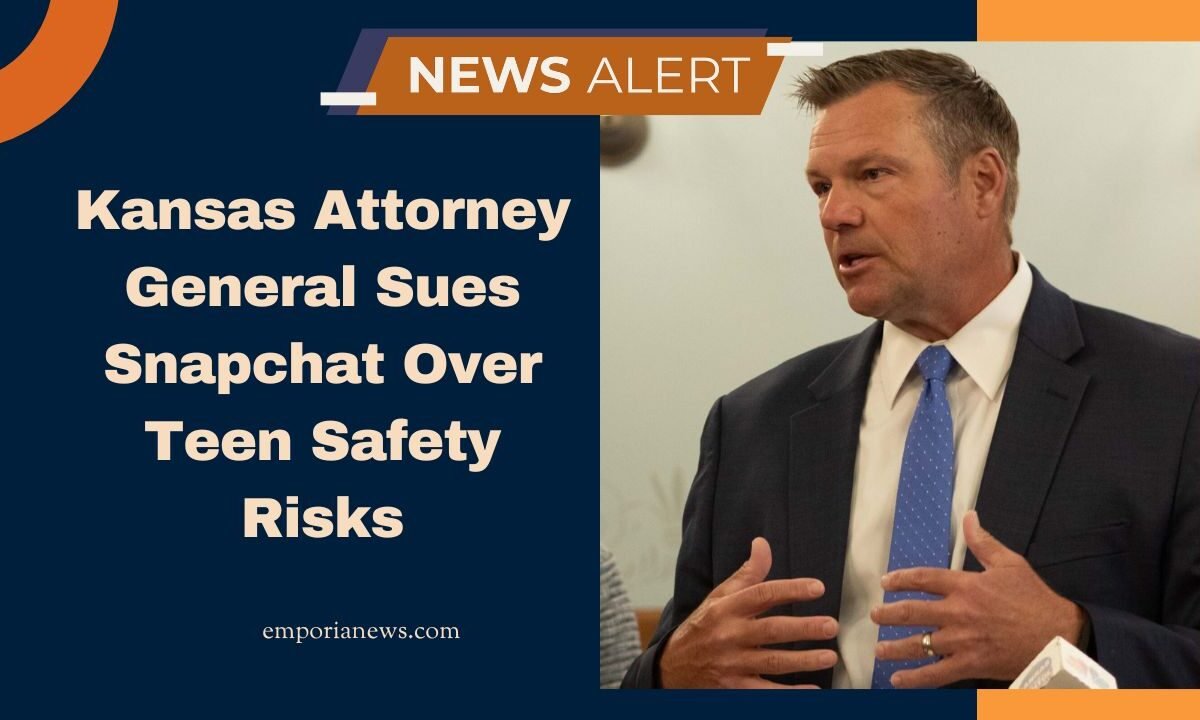The Kansas Attorney General, Kris Kobach, has launched a new legal battle against Snap Inc., parent company of Snapchat, alleging the platform poses serious safety hazards to teens.
The lawsuit claims deceptive marketing, addictive design elements, and frequent exposure to harmful content are being hidden from parents and regulators.
In this article, we dive into every detail of the case: allegations, legal framework, available evidence, and what it might mean for teens and social media oversight.
What the Lawsuit Alleges
Kobach’s lawsuit, filed in Washington County District Court, accuses Snap Inc. of multiple violations and misrepresentations. Some of the key claims include:
- Snapchat is marketed with “12+” and “T for Teen” ratings in app stores, giving the impression of mild or controlled content, while the suit argues that mature content, nudity, profanity, drug references and more appear regularly.
- Snap allegedly designed addictive features such as “Snapstreaks”, infinite scroll, and other engagement mechanics that pressure teens to remain continuously active.
- The state claims Snapchat misled parents and consumers about the real risks and security of the platform, violating the Kansas Consumer Protection Act via deceptive practices.
- Internal Snap documents and reported data are cited, asserting that Snap’s own investigations acknowledged risks tied to mental health and addictive usage.
- The complaint references a case where a teen in Shawnee County died of fentanyl poisoning after allegedly purchasing the drug via Snapchat, claiming the platform enables illegal drug transactions.
Kansas claims many of these acts are unconscionable and requests that the court:
- Declare Snap in violation of state consumer laws.
- Issue injunctions to prevent future misleading practices.
- Impose fines, legal costs, and damages.
Stakeholders & Context
Here’s a summary table of the main players, numbers, and context:
| Item | Detail / Figure | Comments / Significance |
|---|---|---|
| Snapchat user base (US / global) | Over 400 million users | Indicates scale and reach. |
| Age rating in app stores | “12+” / “T for Teen” | Central to deception claim. |
| Count of pages in lawsuit | ~ 40 pages | A substantive, detailed complaint. |
| Teen content risk stats (internal / cited) | 80% of Gen Z report some online risk; 47% saw intimate imagery | Used to support risk to youth. |
| County of filing | Washington County, Kansas | Jurisdiction for state action. |
| Other states filing similar suits | Utah, Florida, New Mexico | Suggests multi-state movement. |
Legal & Technical Arguments
Deceptive Marketing & Misrepresentation
The crux of Kansas’s case is that Snapchat is misleading the public about safety. By labeling the app as suitable for teens and minimizing severe content, Snap is accused of violating consumer protection statutes.
Design That Encourages Addiction
Kobach’s complaint highlights system features that lack natural stopping cues. Snapstreaks, reward mechanics, constant new content feeds—all are flagged as tools to exploit adolescent psychology and maintain compulsive usage.
Causation & Harm
Kansas attempts to link app exposure to mental health harm, exposure to drug offers, and more. The lawsuit references internal data, real incidents, and expert commentary to show Snap’s operations have real-world consequences.
Remedies Sought
The state is not merely seeking monetary damages, but also injunctive relief: ordering Snap to change its design, labeling, disclosures, and possibly submit to oversight or audits.
Snap’s Response & Pushback
Snap Inc. has responded by stating that user safety is a priority, and that no single feature can eliminate all risk. They assert they continuously evolve protections against bad actors and misuse.
Officials in Kansas, including Governor Laura Kelly’s office, have disputed some of Kobach’s claims, suggesting they are exaggerated or politically motivated.
Potential Impact & What’s at Stake
- If successful, Kansas’s lawsuit may force Snapchat to overhaul addictive design elements and increase transparency around content and user protections.
- Many states with similar consumer laws may follow, leading to a wave of regulation on social media platforms.
- The case may reshape how tech platforms are held accountable for mental health, addiction, and minors’ exposure to dangerous content.
- Snap could face substantial financial liabilities, mandated compliance costs, and reputational damage if courts rule against it.
The Kansas lawsuit against Snapchat marks a significant escalation in the scrutiny of social media’s effects on youth. By alleging deceptive practices, addictive design, and exposure to dangerous content, Attorney General Kris Kobach aims to force the platform to account for the risks it poses to teens.




